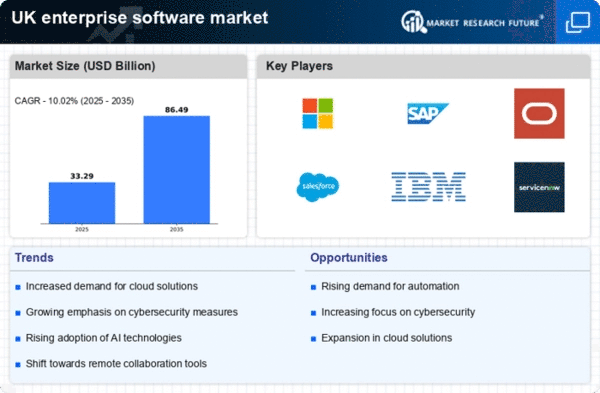Integration of Artificial Intelligence
The integration of artificial intelligence (AI) into enterprise software is emerging as a pivotal driver in the UK market. Businesses are increasingly leveraging AI technologies to enhance operational efficiency, automate processes, and derive actionable insights from data. Recent studies suggest that AI adoption in the enterprise software market could lead to productivity gains of up to 30%. As organizations seek to harness the power of AI for decision-making and process optimization, software vendors are responding by developing innovative solutions that incorporate machine learning and predictive analytics. This trend indicates a growing demand for AI-enabled software, positioning the enterprise software market for substantial growth as companies strive to remain competitive in an increasingly digital landscape.
Shift Towards Subscription-Based Models
The enterprise software market in the UK is undergoing a transformation with a notable shift towards subscription-based models. This change is driven by the desire for cost-effective solutions that offer flexibility and scalability. Businesses are increasingly opting for Software as a Service (SaaS) offerings, which allow them to access software without the burden of large upfront costs. Recent market analysis indicates that subscription-based software solutions are projected to account for over 50% of the enterprise software market by 2026. This trend suggests that software vendors who adapt to this model may benefit from a broader customer base and recurring revenue streams, thereby influencing the overall dynamics of the enterprise software market.
Focus on Customer Experience Enhancement
Enhancing customer experience is becoming a critical focus for businesses in the UK, driving demand for enterprise software that supports customer relationship management (CRM) and engagement strategies. Companies are recognizing that a positive customer experience can lead to increased loyalty and revenue. As a result, the enterprise software market is witnessing a shift towards solutions that provide comprehensive customer insights and personalized interactions. Data indicates that organizations investing in customer experience technologies can achieve revenue growth of up to 20%. This trend suggests that software providers who prioritize customer-centric features and functionalities may find themselves well-positioned in the competitive landscape of the enterprise software market.
Regulatory Compliance and Data Protection
The enterprise software market in the UK is increasingly influenced by stringent regulatory compliance requirements and data protection laws. With the implementation of the General Data Protection Regulation (GDPR), businesses are compelled to adopt software solutions that ensure compliance with data handling and privacy standards. This regulatory environment has led to a heightened demand for enterprise software that incorporates robust security features and compliance tracking capabilities. It is estimated that around 70% of UK enterprises prioritize compliance when selecting software solutions, indicating a clear market driver. As organizations navigate the complexities of regulatory frameworks, the enterprise software market will expand, particularly for solutions that offer comprehensive compliance management functionalities..
Increased Demand for Remote Work Solutions
The enterprise software market in the UK is experiencing a notable surge in demand for remote work solutions. This shift is largely driven by the need for businesses to maintain operational continuity while accommodating a distributed workforce. According to recent data, approximately 60% of UK companies have adopted some form of remote work software, indicating a significant transformation in workplace dynamics. As organizations seek to enhance collaboration and productivity among remote teams, the enterprise software market will see continued growth in tools that facilitate communication, project management, and virtual collaboration.. This trend suggests that software providers focusing on remote work capabilities may find lucrative opportunities in the evolving landscape of the enterprise software market.
















